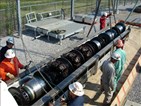Pipeline Safety And Operational Excellence: GE Oil & Gas First Pipeline Inspection Company To Attain Latest ISO Certification

PII Pipeline Solutions Gains Early ISO 9001 Certification; Only Operator Globally to Attain ISO/TS 29001
Houston, TX - Building on its tradition of leadership in safety and quality compliance within the global pipeline industry, GE Oil & Gas, PII Pipeline Solutions announces that it has successfully attained third-party certification to the latest internationally recognized quality management system standard, ISO 9001: 2008.
Lloyds Register Quality Assurance (LRQA), a leading third-party certification body, recently completed a series of assessments at PII Pipeline Solutions' main facilities in the United States, United Kingdom and Germany against ISO 9001: 2008, which effectively replaced ISO 9001: 2000 in November 2008. All existing certificates issued against ISO 9001: 2000 will become obsolete at the end of 2010. GE has therefore proactively secured certification well in advance of the expiration deadline.
In 1991, PII Pipeline Solutions became the first pipeline inspection company globally to attain quality management system certification, and ISO 9001 is now the preferred standard used by over 500,000 companies around the world.
"Achieving ISO 9001: 2008 certification reflects our ongoing commitment to quality, safety and operational excellence at both our own and customer facilities globally," said John Bucci, General Manager for GE Oil & Gas, PII Pipeline Solutions. Furthermore, many international pipeline operators now expect in-line inspection vendors to have ISO 9001 certification as an absolute minimum, Bucci noted.
To this end, and for the first time, GE Oil & Gas - PII Pipeline Solutions' Houston facility also was successfully assessed against two additional certification standards, in parallel to ISO 9001 certification, namely: ISO/TS 29001: Petroleum, petrochemical and natural gas industries — sector-specific quality management systems — requirements for product and service supply organizations; and EN 13980: 2002: Potentially explosive atmospheres — application of quality systems.
Being the first in-line inspection business to attain ISO/TS 29001: 2007 certification will further underpin GE's commitment to be a world-leading pipeline integrity business. Based on ISO 9001, the ISO/TS 29001: 2007 standard sets out additional oil and gas industry specific requirements and is the international identical equivalent of API standard API Spec Q1. Both standards are complementary to API standard 1163, which defines requirements for the qualification of in-line inspection systems and personnel to ensure the safety and integrity of pipelines that transport gas and hazardous liquids.
Similarly, EN 13980 is also based on ISO 9001, and is linked to European legislation — Directive 94/9/EC for the design and operation of equipment for use in potentially explosive atmospheres (ATEX Directive). This important legislation created a framework for ensuring that products (pipeline inspection tools) are designed, manufactured and operated in accordance with specific essential health and safety requirements with the overall aim of explosion prevention. The ATEX Directive has since rapidly become an internationally recognized requirement of many pipeline operators worldwide.
GE Oil & Gas was the first pipeline integrity services provider to deploy ATEX compliant inspection tools - EC-type examination certification through an independent notified body. The company was also the first to earn ATEX quality management system certification against EN 13980 in 2006.
The recent addition of EN 13980 certification for the Houston facility emphasizes the commitment to deliver a service world-wide based on the highest level of safety to prevent harmful incidents during a pipeline inspection. The design, manufacture and operation of inspection tools are ATEX compliant.
These certifications are the latest earned by GE Oil & Gas, PII Pipeline Solutions as part of its overall quality, environmental health and safety commitment.
SOURCE: GE Oil & Gas
